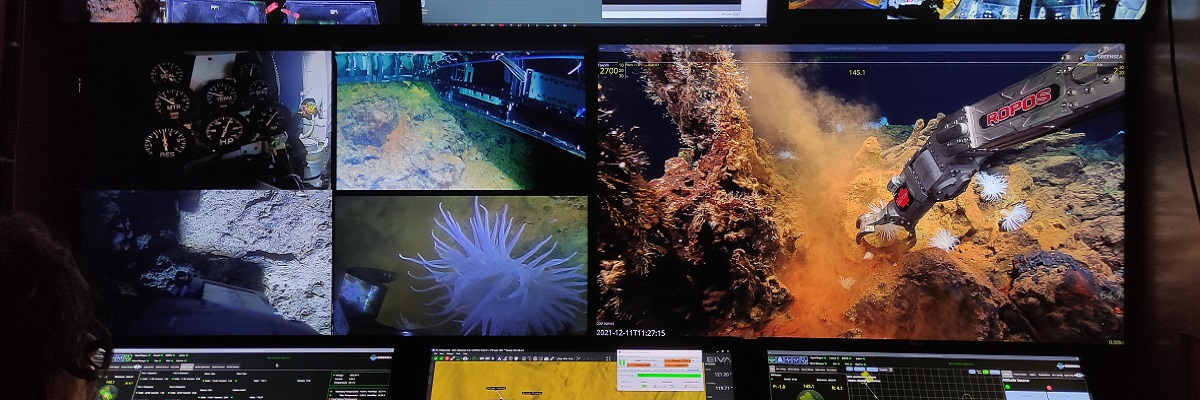BGR 2021 Expedition Summary
RV Pelagia, December 1 – 30, 2021
The CSSF team joined the BGR team onboard the RV Pelagia in Port Louis, Mauritius on December 1, 2021. The ROPOS system, recently offloaded from the Korean vessel RV Isabu, sat waiting on the pier as the RV Pelagia pulled alongside.
After 3 days of loading containers, pulling cables and testing equipment, the RV Pelagia left the dock in Port Louis and commenced the transit to the German lease areas adjacent to the Southeast Indian Ridge (SEIR) and the Rodriguez Triple Junction (RTJ). After 5 days of transiting the Indian Ocean, the vessel arrived at the first dive site, only to find the 24-hour weather forecast to be less than ideal, causing the first of several weather delays.
In the lee of the poor weather were three days of clear skies and calmer seas, which allowed for four science dives up to a depth of 3,000 m. During these dives, numerous biological and geological samples were taken, including sediment cores. In addition, the never before deployed Autonomous Temperature Acquisition Probe (ATAP) was trialed at two sites, with excellent results. The final science dive took place on the heels of two more days lost to weather, and the objective was to recover experiments deployed two years earlier at depths of 3,060 m and 3,340 m. Unfortunately, the dive had to be aborted with the ROV only 80 m from the seafloor due to the safe working load of the vessel A-frame, which was close to being exceeded due to increasing swell height.
The subsequent days were spent focused on the integration and operation of the ROCS coring drill, with the objective of capturing sulphide cores in key areas of interest within the German seabed leases. After 24 hours of integration time, ROPOS was deployed for the first time at sea with the ROCS drill mounted to the front of the vehicle. The first test dive(s) revealed operational issues which required the CSSF team to conjure up work arounds. Once these initial issues were resolved, ROPOS went to the seafloor loaded with core barrels configured in several ways to provide the team with options when drilling. The initial coring dives produced minimal results as the team learned which settings and barrel configurations were optimal for capturing sulphide material. As the team refined their procedures for coring, the results improved, such that by the final dive three out of the four barrels contained sulphide cores.
On Christmas day, the RV Pelagia turned around and started to make its way back to Port Louis. Four days later, the ship was alongside in the Port, and demobilization of the ROPOS system began.
By the Numbers
ROPOS performance during the expedition
12
Days
Over 12 operational days, ROPOS completed 5 dives, totalling 37 hours of science dives and 57.5 hours of seabed coring.
5
seabed cores recovered
Combined core lenghts of 2.92 m in different substrates, primarily sulphides.
1000+
Samples
5 push cores, 20 geological samples, and 999 biological samples collected.


